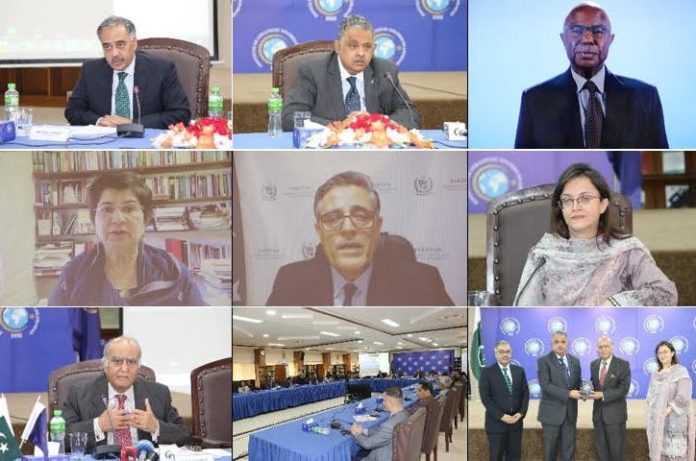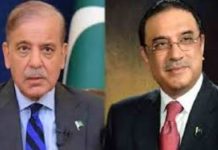The Centre for Strategic Perspectives (CSP) at the Institute of Strategic Studies (ISSI) organised a Roundtable Discussion to Commemorate the “International Day to Combat Islamophobia.” Ambassador Rizwan Saeed Sheikh, Additional Secretary, MoFA was the Guest of Honour.
The other participants included: DG ISSI Ambassador Sohail Mahmood; Ambassador Hissein Brahim Taha, Secretary General, OIC (via recorded message); Ambassador Khalil Hashmi, Permanent Representative of Pakistan to the United Nations, Geneva (via recorded message); Prof. Dr. Samina Yasmeen, Director and Founder, University of Western Australia’s Centre for Muslim States and Societies (on-line address); and Ambassador Khalid Mahmood, Chairman, BoG, ISSI. Dr. Neelum Nigar, Director CSP, made introductory remarks.
DG ISSI Ambassador Sohail Mahmood, in his welcome remarks, stated that Pakistan’s vigorous diplomatic efforts played a pivotal part in the designation of 15 March as the ‘International Day to Combat Islamophobia’ by the United Nations General Assembly through an unanimously adopted resolution last year. He traced the evolution of Islamophobia as a phenomenon and its myriad manifestations — including denigration of Islam’s most sacred personalities, desecration of the Holy Quran, and systematic social, political and economic discrimination against Muslims. In Pakistan’s neighbourhood, an ideological agenda was normalizing anti-Muslim sentiments and culminating in discriminatory legislation and policies. He stressed that at a time of extreme tumult in the world, it was imperative to avoid accentuation of religious or cultural fault-lines. “This is a time to build bridges, not to create further divisions.” “As we go forward, it is hoped that commemoration of this International Day worldwide would raise awareness about Islamophobia and strengthen the resolve to combat this pernicious phenomenon”, including through efforts for mutual understanding, dialogue and inter-faith harmony.
Ambassador Taha, in his message, stated that on this commemorative day, OIC commends the achievement by the United Nations, for the designation of 15 March as International Day to Combat Islamophobia. This Day would serve as a continuous reminder about the danger of violence based on religion or belief, and, at the same time, as an opportunity for the international community to reiterate its commitment to fighting xenophobia, and to promoting the values of tolerance, understanding, inter-faith harmony, and peaceful coexistence among different religions.
Dr. Samina Yasmeen, in her keynote speech, said that Islamophobia represents a false sense that Muslims are outside the system and their rights do not matter; this can have generational impacts, particularly on children. Peace and cooperation in the society can be achieved if Muslims themselves become agents of change against Islamophobia in the society. Furthermore, tools need to be given to both Muslims and non-Muslims by engaging educational institutions especially in Muslim minority countries to work together and come up with new counter-narratives to address this issue. Dr. Yasmeen underscored the importance of building “partnerships” to foster better mutual understanding and combat Islamophobic attitudes.
Ambassador Khalil Hashmi remarked that the triggers of Islamophobia and targeting of the Muslim community predates the attacks that took place in Christchurch on 15 March 2019. Various UN and Human Rights reports have highlighted the prejudices and attacks the Muslim community faces daily across the world and it is reinforced by biased media representation. Pakistan has played a lead role in raising awareness about this issue and the need to counter it for several years at international platforms. The international commemoration of this Day will hopefully bring about a change in the normative framework with regards to the Muslim community.
Ambassador Rizwan Sheikh, in his address, said that in today’s inter-connected world where people are empowered to share their views and opinions freely Islamophobia can be very dangerous thing as there are two sides to it, the perpetrators and the victims. There is a “fear” of Islam that has been deliberately created and being propagated. The UN resolution should be a starting point for further discussion and engagement and should act as a trigger point to act against Islamophobia and all others forms of religious discrimination and for that states need to evolve legal deterrents.
Chairman BoG ISSI Ambassador Khalid Mahmood, in his concluding remarks, said there is a need to raise awareness about Islamophobia and present the true image of Islam by the Muslim community. Furthermore, respect for all religions and inter-faith harmony need to be pursued to tackle this menace.

















